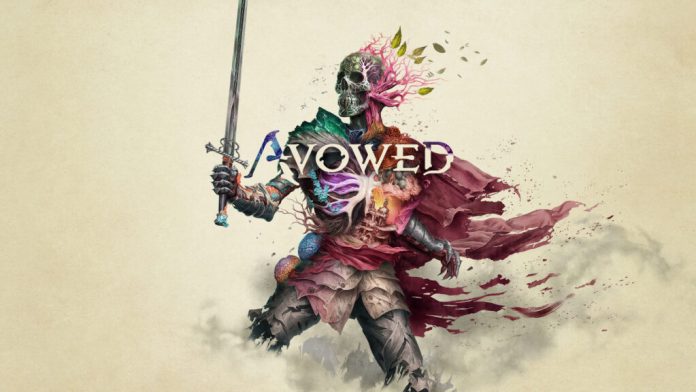This review will contain spoilers through the end of the second act of the game, which takes place in The Emerald Stair.
The capsule review, the logline summary, is what it says in the title: Barring some inconceivable collapse in the final stretch of the game, this is the best one of these since Fallout: New Vegas. Given how good the final acts of the first two games in this series were, I suspect that’s a safe thing to say right now.
It’s important to start with what this thing actually is. The previous two titles in Obsidian’s world of Eora, Pillars of Eternity and Pillars of Eternity II: Deadfire, were isometric party-based real-time-with-pause RPGs that harkened back to the days of Icewind Dale and Neverwinter Nights — they were even made by a few of the same people. The games were tidy successes, but neither found the audience or cultural moment that Baldur’s Gate 3 did upon its own release. They were incredibly dense, incredibly well-written games, and they represented fantastic revisions of the d20 system that was hacked together out of the Advanced Dungeons & Dragons ruleset for that original run of D&D games in the 2000s It was time for a slightly different approach, however, and the studio was coming off another moderate success with The Outer Worlds, another first-person RPG adventure with an action bent — sort of a Fallout: New Vegas in space. I’ve bounced off The Outer Worlds twice now; it’s well-written enough and I like some of the characters, but the tone is a bit too jokey and some poor choices were made with the systems, especially loot and crafting.
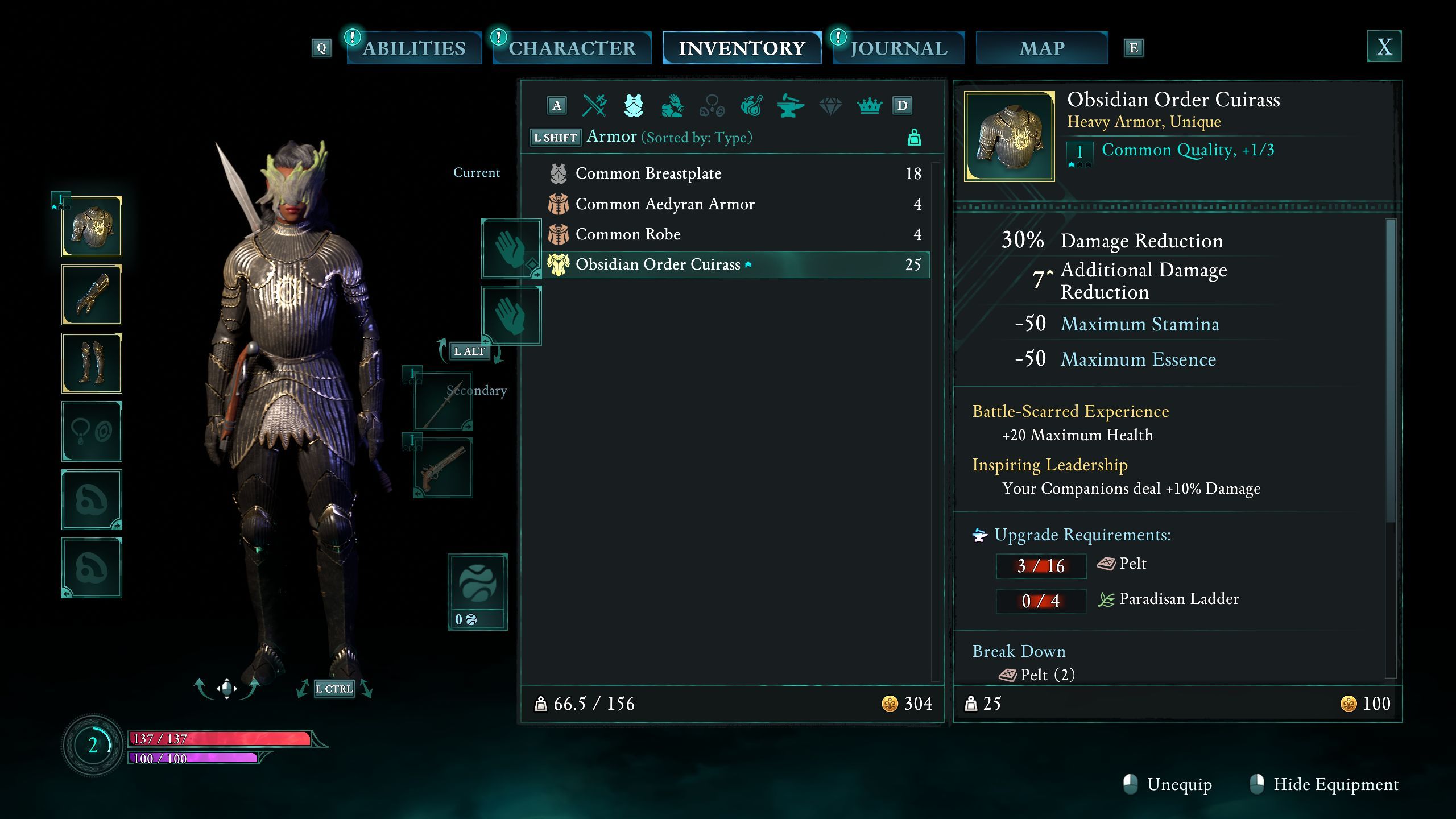
Avowed is another game in that vein, but here, everything is singing. All the systems work together. The simplified, well thought-out RPG bones from Pillars form the structure for first-person combat that feels great in melee, at range, or using spells — something the Elder Scrolls games have promised but never actually been able to deliver. Despite superficial comparisons to games like Morrowind and Skyrim due to shared genre and past (and present) connections between the two studios, Obsidian’s Avowed feels like it has been paying attention less to what Bethesda has being doing in this space recently with the underwhelming Fallout 76 and Starfield and instead learning from Arkane Studios, which until the Redfall disaster was on a heater of fantastic first-person combat-focused RPG-adjacent adventure games like Dishonored, Prey, Dishonored 2 and Deathloop. The Dishonored franchise’s influence is particularly notable in how good the parkour and mantling feels during the frequent platforming that Avowed asks even moderately curious players to perform — if you want to explore anything but the few dirt roads of the Living Lands, you’re going to be clambering up rock walls and jumping over pits, burning down giant spider webs with fire magic and freezing water into icy platforms with cold “grenades” you picked off a dangerous plant.
Dialogue checks are simple pass/fail states based on where you’ve allocated your character’s attribute points, and the abilities on your character’s three skill trees — Fighter, Ranger, and Wizard — are locked by level, not by prerequisite skills (with one half-exception in the Wizard tree related to Grimoire Mastery). This opens up a wide variety of builds, especially across the two martial trees; gun wizards, spellblades, parry-based defensive fighters, magic archers, crit rogues, and more are possible in addition to the standard wand-using wizards, bow-shooting rangers and fighters with heavy armor and huge swords. And then, of course, there’s the fourth, special skill tree: Your godlike powers.
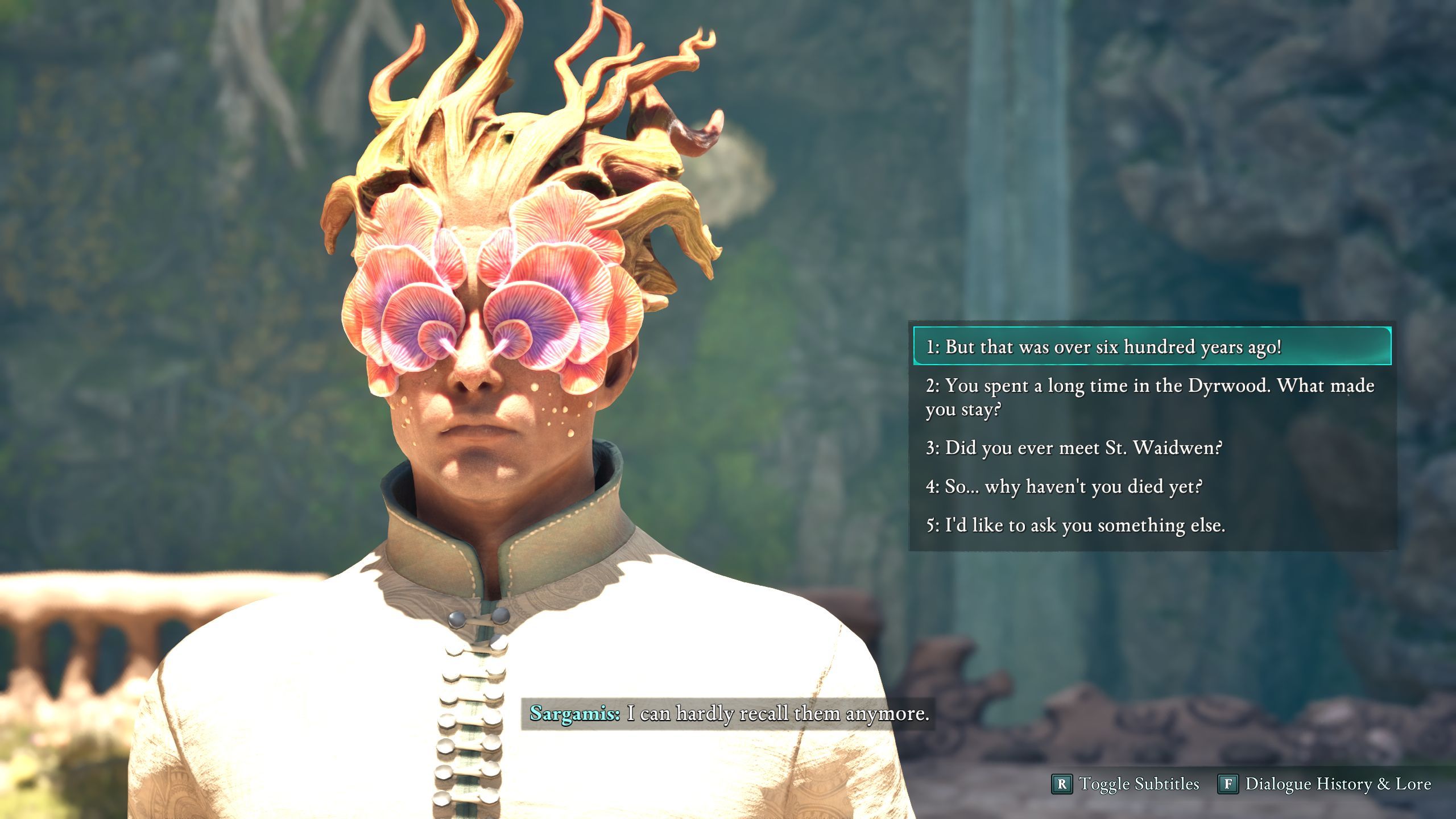
In Avowed you play the Envoy, sent to the untamed Living Lands on a personal mission from your Emperor to combat a mystical plague called the Dreamscourge. You are a godlike, which as veterans of the Pillars franchise will know is a small fraction of the human and elf population who were “touched” by one of Eora’s very real, very powerful deities in the womb, and born with features that express the god they’re like. So for Magran, with the purview of fire, the godlike will have hair or eyes that looks like supernatural flame; for Rymgand, with the purview of cold and death, frozen skin or an exposed skull; godlikes of Hylia, patron of birds, have feathers instead of hair — and so on. Your godlike’s permutation is fungi.
You have to choose some form of mushroom or lichen to grow off of you at character generation, from tastefully-obtrusive eyebrows to great colorful growths that obscure your whole face. Players have the option to hide the godlike features when displaying their character’s model much like other games allow you to hide your character’s helmet — but the growths are very much still there. Just about every character in the game will react to them, and some will wonder which member of the pantheon’s godlike you are. You do not know, but over the course of Avowed’s story, one way or another, you’re going to find out. As you play through the game, you’ll get additional story-gated godlike powers to use in and out of combat; while the Fighter and Ranger trees might only have a few active abilities each, between them, your godlike powers, and your companion’s abilities, you’ll always have buttons to press.
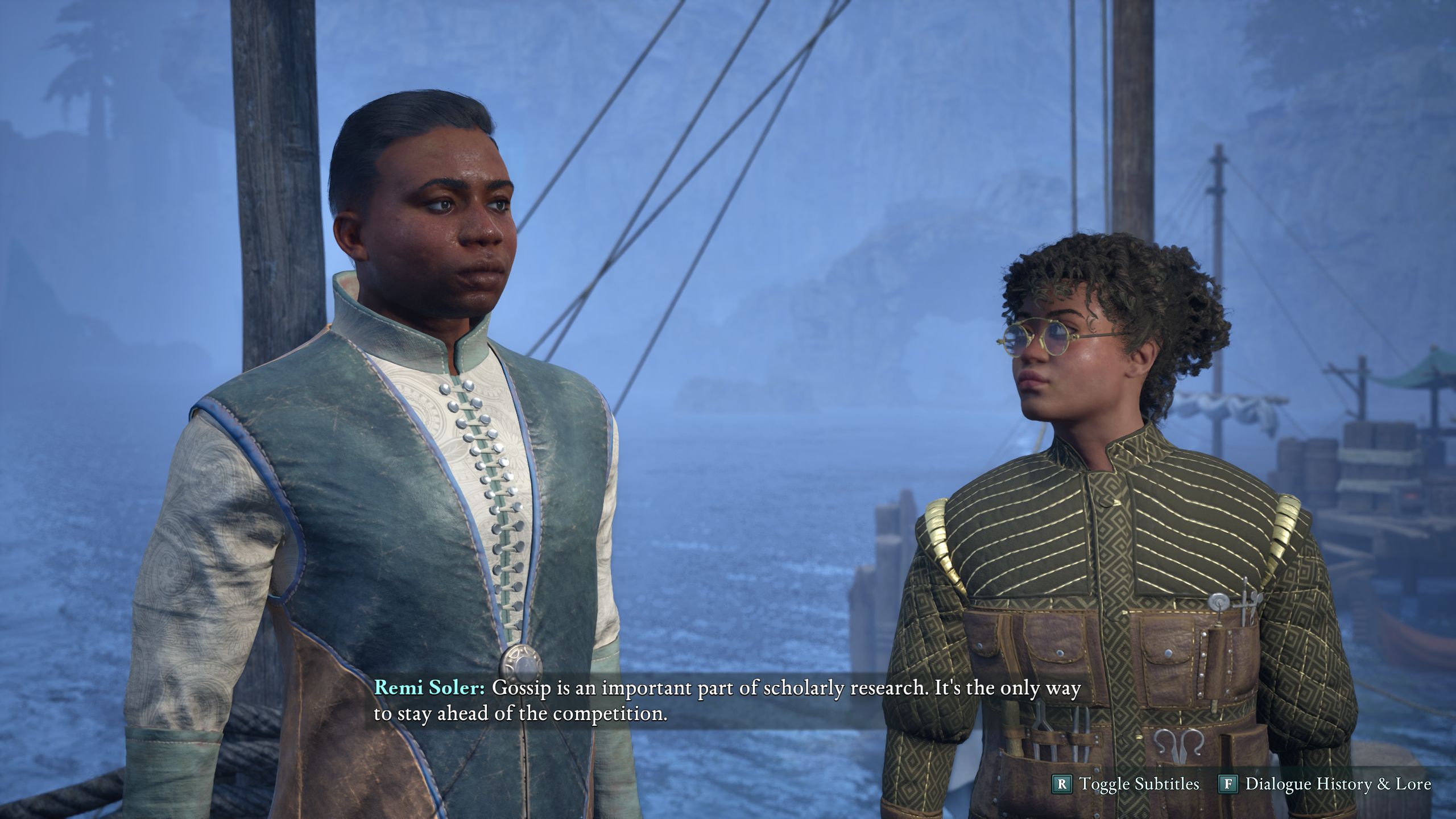
The storytelling and character work in the game is top-tier. Some of that is old-hand experience and marketing savvy; you don’t get ten feet off the dock in the very first settlement after the tutorial dungeon before you run into a tall shark man (aumaua) voiced by Brandon Keener, who Mass Effect fans will recognize as the voice of Garrus Vakarian. This is Kai, your first companion, an ex-soldier whose carefree and sardonic disposition masks a tensely-wound, guilt-stricken mess who believes in second chances for everyone but himself. And yeah, Keener’s basically just straight-up doing the same exact vocal performance, just without the subtle distortion filter that BioWare put over every Turian. If you’re on the fence about picking this one up, if it sounds like One of Those Games that you know you like but you’ve been burned by before, Obsidian’s here to tell you: Within an hour of starting a new save file, you’ve got a Shark Garrus, and he’s just like you remember (that is to say, without all the weird C-Sec cop stuff from Mass Effect 1). Once you’re acclimated with Kai, the game can take some more ambitious swings with the next three companions: The taciturn tracker dwarf Marius, who is as reserved as his buddy Kai is extroverted; the horny old cat-lady (orlan) archeologist Yatzli; and the idealistic Vailian animancer Giatta, who feels like she could have been the protagonist of a different version of this game.
The Living Lands may be one of the most dangerous frontiers of Eora, but someone from everywhere has washed up on its shores, letting Avowed show off the wonderful creativity of the world that Obsidian has created. The Vailians are genre expressions riffing on the medieval Italian city-states in popular imagination; they talk of coin and trade companies and letters of marque, and all of them do so in the most pleasing and sonorous fantasy-Italian accents the voice actors have to offer. These Vailians are scholars who practice animacy, the art of soul binding — necromancy with better public relations. There are reclusive dwarves in the mountains, holed up in their great Solace Keep, so serious in their self-partition from the world that any dwarf that leaves can never come back. There are thieves and exiled religious dissidents and pirates, and deserters on the run from Kai’s homeland, the expansionist naval kingdom of Rauatai (Kai is in fact one of those). And then there are the Aedyrans, an empire known in the Pillars game mainly for losing its outlying colonies to various revolts both spiritual and economic. This is your empire, and this time, the Aedyrans intend to keep their colonial prize.
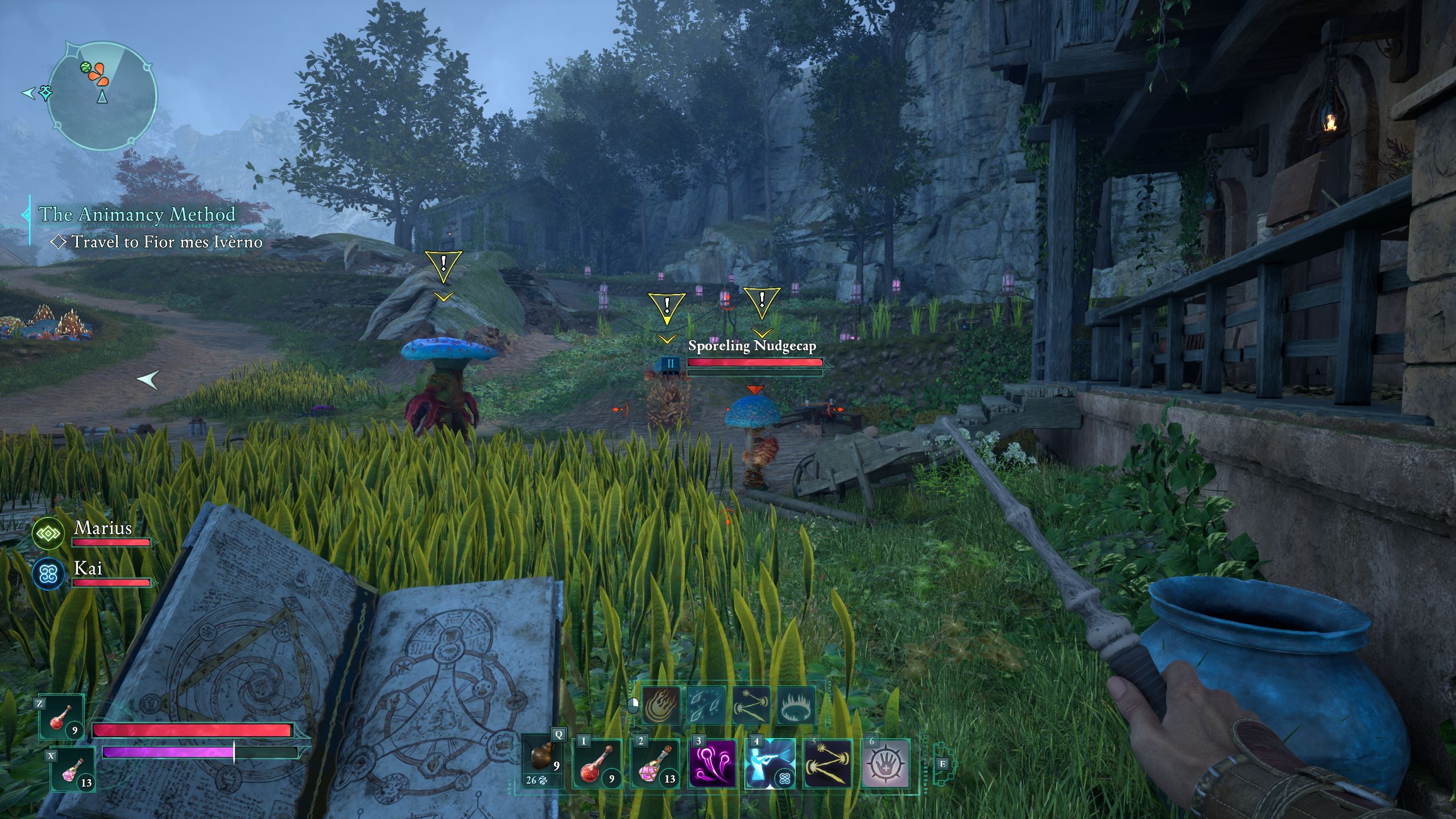
The two great axes of conflict for your envoy in the Living Lands are thus: First, you need to solve the mystery of the Dreamscourge plague, and find out what connection it has to you and the Voice you started hearing in your head within minutes of washing up on the Living Land’s shores. Second, you need to navigate the politics of the Aedyran colonial project without losing your head, because the Steel Garrote, a group of paladins who nominally enforce contracts for the empire’s patron goddess Woedica but who are in practice a catastrophic mix of religious fanatic death cult and nationalist settler paramilitary, has decided they’re putting everyone who stands in the way of “imperial law” to the sword — and that includes insufficiently deferent and obedient Aedyrans. They’re led by Inquisitor Lödwyn, a six foot tall woman in black-masked plate mail who has died and come back from the Beyond to prosecute holy war for her cruel goddess. You can choose to have dated her before she was sealed in the Vader suit, as part of your backstory. You can also choose to have dated her afterward!
Rather than a full open world, Avowed is a series of large zones, each of which weaves together prosaic, desperate, and often deeply-depressing political story beats with more fantastical threads about the magic of the Living Lands, the creatures and plants therein, and the ruins of the people who lived there before all the settlers and refugees arrived, all in service of telling a contained arc of the larger narrative. The structure of this is pretty familiar stuff: You’ve got a main quest; you’ve got side quests that you pick up by speaking to people marked with an exclamation point on the map; you’ve got collection quests (totems, treasure maps, so on) that don’t give you map markers at all; and there are dozens of little scenes per area that you just run into while walking around. Some of these might give you gold or some item; most of them are just added texture for the world. But everything is in service of the true overarching story that Avowed is telling: The ongoing relationship between you and the Voice in your head.
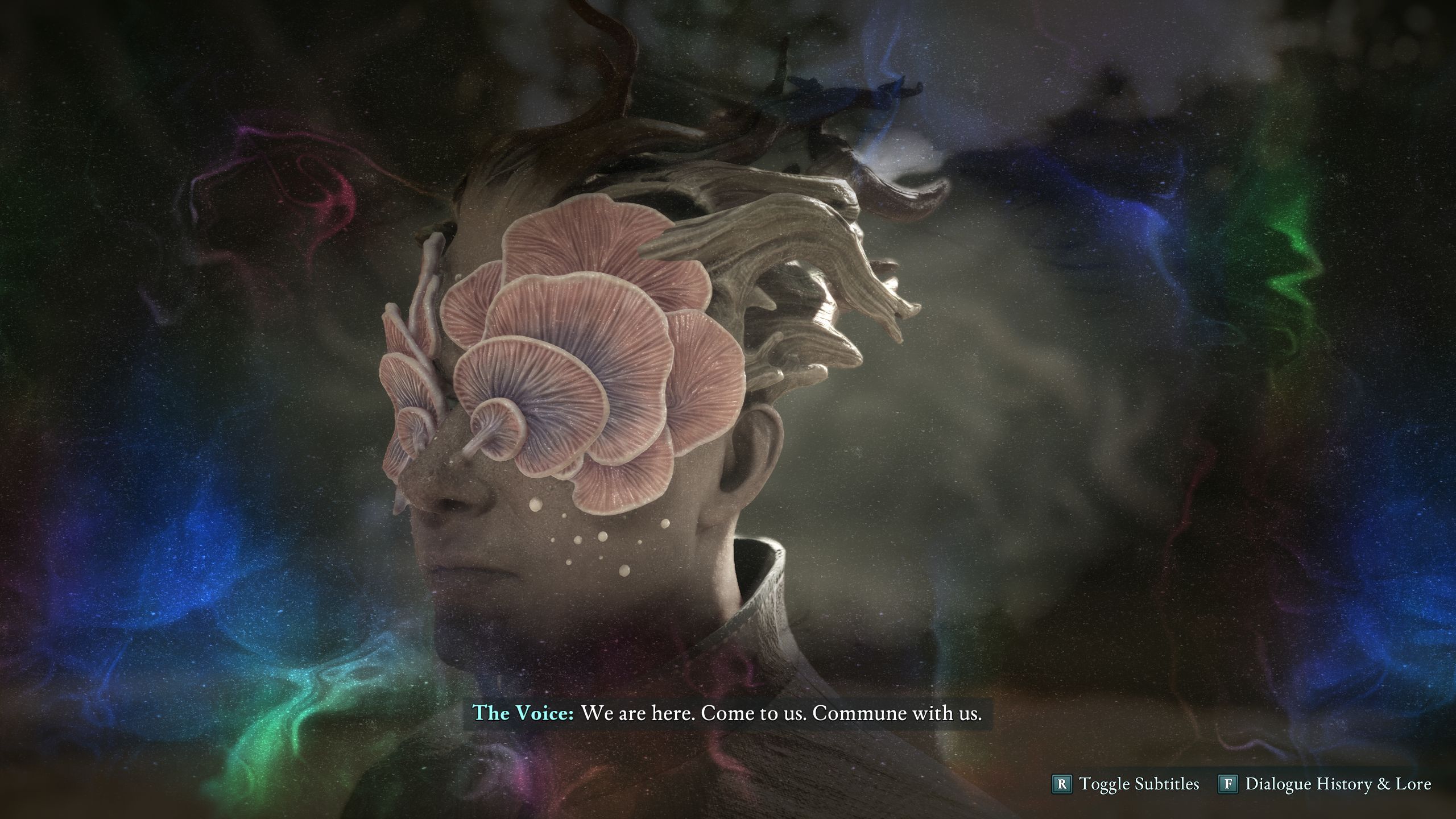
Without getting too deep into spoiler territory (and with the caveat that some of the perspective on this might be recast by events later in the game), the Voice is very real and very interested in the choices you make. The choices you make display who you are, and they teach the Voice about the world around both of you and the way you see them. It’s unclear who or what exactly the Voice is — there are a couple obvious theories, to both the player and the characters themselves in the story — but the way you play the game, who you favor, who you foil, how you do it; all of these teach the Voice. And in return, the Voice teaches you: In each main area there is an Ancient Memory, where you go on a spirit journey re-enacting the life of a figure from the folklore of the people who first settled the Living Lands. These are almost like heroquests from King of Dragon Pass, where you decide how the ritual story is told as you enact it from their perspective — and the consequences here are what lessons the Voice takes away about itself and its own history. The hand-drawn art for all these sequences is incredibly beautiful as well; more games should avail themselves of that.
It’s just a beautiful game in general, really. I did not expect it to look this good. Avowed continues a trend seen in fantasy games like Diablo IV and Dragon Age: The Veilguard where suites of effects like ray-tracing and new shadow technology along with DLSS processing to ease some of their performance cost really enables teams with smart, talented art direction to create fundamentally good-looking worlds without worrying about “photorealism.” It has the same smart, clean UI/UX that the Pillars games did as well. I’m playing on a PC with a 4070 TI Super and an AMD 7800 and I’ve had no performance issues whatsoever with moment-to-moment gameplay with everything at max settings. The one problem I have is that every two to three hours the game crashes to desktop with the UE-Alabama Game Fatal Error that’s been going around most of the support boards on this title. This hasn’t been more than a minor irritant for me given how often the game autosaves and that I generally take a break from playing every ninety minutes or so anyway, but if it happened more frequently it certainly would be.
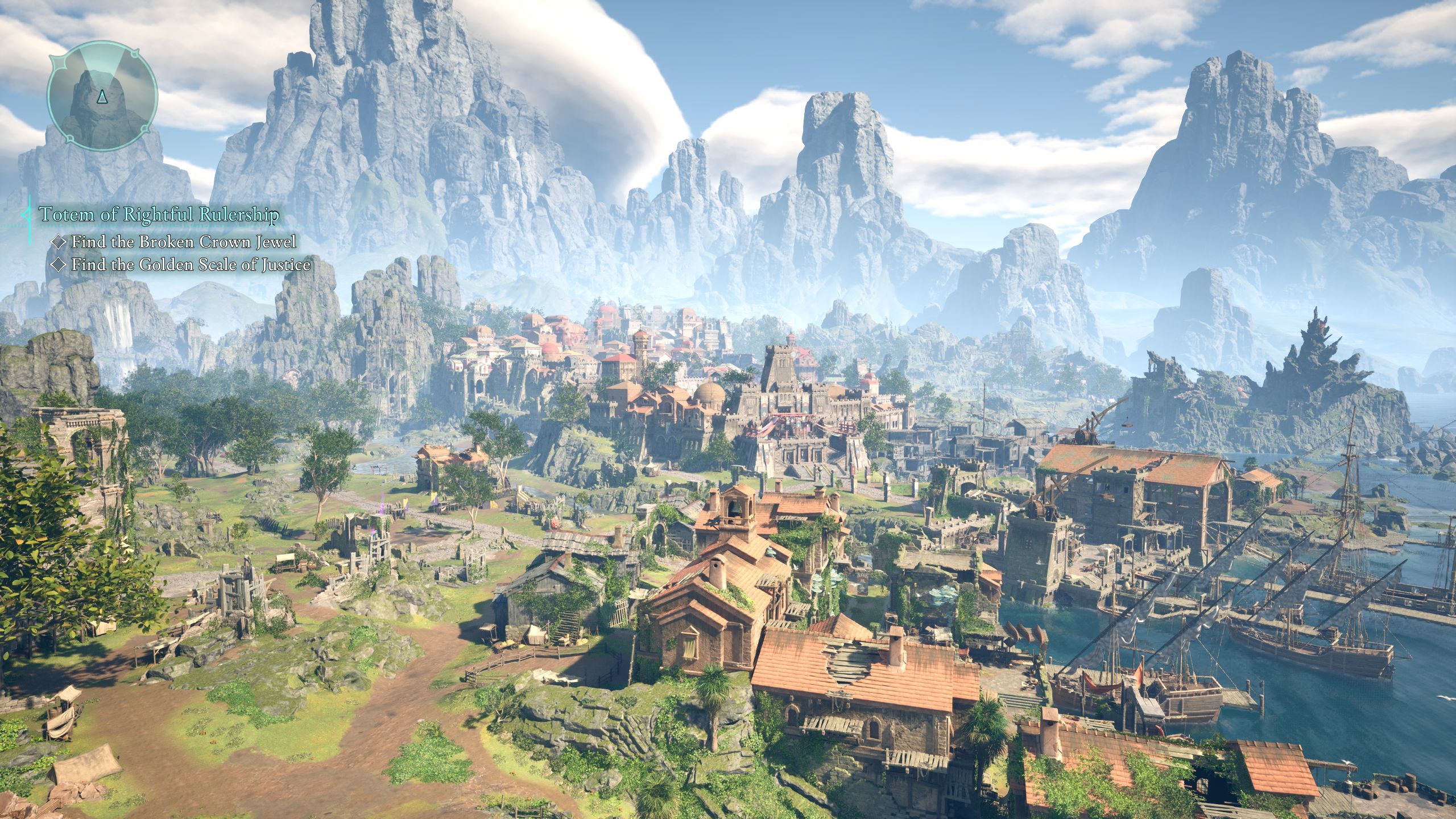
I’m about twenty-five hours into the game now and am at roughly the halfway part — if there’s four major zones, which seems to be the implication from certain parts of the UI, I’ve completed a full pass through two of them. I haven’t felt this way since playing a game for the first time since crossing the Mojave in New Vegas almost two decades ago, and if they stick the landing on this one, it’ll end up being one of the best games on an extremely competitive roster from one of the best studios ever to do it.
Final Verdict: It’s $70 on Steam; I think it’s perfectly fine to give them that much money for a game this good. If you want to try it before you buy it, get a month of Game Pass for PC and play it there, but be warned there are reports that there’s no cross-save play between the Xbox ecosystem and the Steam ecosystem, so if you treat the Xbox Game Pass version like a demo, you’ll have to start all over if you buy it on Steam. That is not an issue for me; I’ve already got a second character file up and running. The game’s that good.
Have any questions or feedback? Drop us a note in the comments below or email us at contact@goonhammer.com. Want articles like this linked in your inbox every Monday morning? Sign up for our newsletter. And don’t forget that you can support us on Patreon for backer rewards like early video content, Administratum access, an ad-free experience on our website and more.
